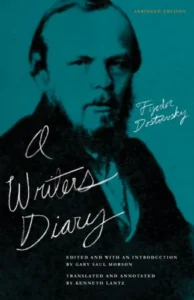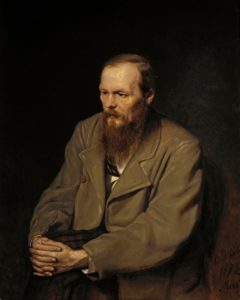Dostoyevsky on Why There Are No Bad People
INSPIRATIONAL, 2 Dec 2024
Maria Popova | The Marginalian – TRANSCEND Media Service
 Legendary Russian writer Fyodor Dostoyevsky (11 Nov 1821–9 Feb 1881) is best known as one of literary history’s titans, but he was also a brilliant entrepreneur and pioneer of self-publishing. Under the auspices of his enterprising wife Anna, Dostoyevsky overcame his ruinous gambling addiction to become Russia’s first self-published author. But it was the release of A Writer’s Diary (public library) — the same collection of his nonfiction and fiction writings that gave us Dostoyevsky’s memorable recollection of how he discovered the meaning of life in a dream — that turned him into a national brand.
Legendary Russian writer Fyodor Dostoyevsky (11 Nov 1821–9 Feb 1881) is best known as one of literary history’s titans, but he was also a brilliant entrepreneur and pioneer of self-publishing. Under the auspices of his enterprising wife Anna, Dostoyevsky overcame his ruinous gambling addiction to become Russia’s first self-published author. But it was the release of A Writer’s Diary (public library) — the same collection of his nonfiction and fiction writings that gave us Dostoyevsky’s memorable recollection of how he discovered the meaning of life in a dream — that turned him into a national brand.
In February of 1876, reflecting on the unanimous acclaim with which the first volume of the journal had been received, 55-year-old Dostoyevsky contemplates the paradox of people-pleasing and writes in the very diary whose success he is pondering:
I am interested only in the question: is it, or is it not, good that I have pleased everybody?
From this, under the heading “On the Subject That We All Are Good Fellows,” he springboards into an exquisite discussion of our deepest goodness, emanating a deep faith in the human spirit — all the more impressive given what Dostoyevsky himself endured — and a conviction that we are inherently good despite the badness we sometimes put on like an ill-fitting suit to impress by imitating those we mistake for impressive.
A century before Isaac Asimov’s memorable invitation to optimism over cynicism about the human spirit, Dostoyevsky writes:
We are all good fellows — except the bad ones, of course. Yet, I shall observe in passing that among us, perhaps, there are no bad people at all — maybe, only wretched ones. But we have not grown up to be bad. Don’t scoff at me, but consider: we have reached the point in the past where, because of the absence of bad people of our own (I repeat: despite the abundance of all sorts of wretches), we used to be ready, for instance, to value very highly various bad little fellows appearing among our literary characters, mostly borrowed from foreign sources. Not only did we value them, but we slavishly sought to imitate them in real life; we used to copy them, and in this respect we were ready to jump out of our skins.
While much of Dostoyevsky’s discussion of such misplaced imitation pertains to that specific point in Russia’s cultural history, embedded in it is a broader reminder that, to borrow Eleanor Roosevelt’s memorable words, “when you adopt the standards and the values of someone else … you surrender your own integrity [and] become, to the extent of your surrender, less of a human being.” In a remark particularly poignant in the context of Russia’s troubled present-day civic climate, Dostoyevsky considers the allure of imitating such villains:
We used to value and respect these evil people … solely due to the fact that they appeared as men of solid hate in contradiction to us Russians, who, as is well known, are people of very fragile hate, and this trait of ours we have always particularly despised. Russians are unable to hate long and seriously, and not only men but even vices — the darkness of ignorance, despotism, obscurantism and all the rest of these retrograde things. At the very first opportunity we are quick and eager to make peace… Please consider: why should we be hating each other? For evil deeds? — But this is a very slippery, most ticklish and most unjust theme — in a word, a double-edged one… Fighting is fighting, but love is love… We are fighting primarily and solely because now it is no longer a time for theories, for journalistic skirmishes, but the time for work and practical decisions.
Noting that the Russian people must recover from “two centuries of lack of habit of work,” he articulates the more universal and rather lamentable human tendency to deflect insecurity by lashing out:
The more incompetent one feels, the more eager he is to fight.
And yet Dostoyevsky approaches the problem with deep compassion rather than harsh judgment:
What, I may ask you, is there bad about it? — Only, that this is touching — and nothing more. Look at children: they fight precisely at the age when they have not yet learned to express their thoughts — exactly as well. Well, in this there is absolutely nothing discouraging; on the contrary, this merely proves to a certain extent our freshness and, so to speak, our virginity.

He observes how this tendency plays out in his own craft — something undoubtedly amplified today, when criticism is not only professionalized but also sensationalized for profit by the commercial media industrial complex:
In literature, because of the absence of ideas, people scold each other, using all invectives at once; this is an impossible and naïve method observed only among primitive peoples; but, God knows, even in this there is something almost touching: exactly that inexperience, that childish incompetence even in scolding in a proper manner.
But underneath such defensive insecurity and cynicism, Dostoyevsky argues, lies a deeper, most earnest yearning for goodness:
I am by no means jesting; I am not jeering: among us there is a widespread, honest and serene expectation of good (this is so, no matter what one might say to the contrary); a longing for common work and common good, and this — ahead of any egoism; this is a most naïve longing, full of faith devoid of any exclusive or caste tinge, and even if it does appear in paltry and rare manifestations, it comes as something unnoticeable, which is despised by everybody… And why should we be looking for “solid hate”? — The honesty and sincerity of our society not only cannot be doubted, but they even spring up into one’s eyes. Look attentively and you will see that … first comes faith in an idea, in an ideal, while earthly goods come after.
It is our responsibility as human beings, Dostoyevsky suggests, to peer past the surface insecurities that drive people to lash out and look for the deeper longings, holding up a mirror to one another’s highest ideals rather than pointing the self-righteous finger at each other’s lowest faults:
A true friend of mankind whose heart has but once quivered in compassion over the sufferings of the people, will understand and forgive all the impassable alluvial filth in which they are submerged, and will be able to discover the diamonds in the filth.
He urges that such compassion be granted to the Russian people, but in his words there is to be found an enduring case for all disenfranchised groups and harshly judged communities:
Judge [the people] not by those villainies which they frequently perpetrate, but by those great and holy things for which they long amidst the very villainy. Besides, the people are not composed of scoundrels only; there are also genuine saints — and what saints! They themselves are radiant and they illuminate the path for all of us!
More than a century before modern psychology exposed the creative mental gymnastics of how we rationalize our bad deeds, Dostoyevsky speaks to the perils of such rationalization:
Somehow, I am blindly convinced that there is no such villain or scoundrel among the Russian people who wouldn’t admit that he is villainous and abominable, whereas, among others, it does happen sometimes that a person commits a villainy and praises himself for it, elevating his villainy to the level of a principle, and claiming that l’ordre and the light of civilization are precisely expressed in that abomination; the unfortunate one ends by believing this sincerely, blindly and honestly.
With the wry caveat that he is “speaking only about serious and sincere people,” Dostoyevsky reiterates his appeal at the heart of his creed:
Judge [people] not by what they are, but by what they strive to become.
All of A Writer’s Diary is a trove of Dostoyevsky’s great sensitivity to the human experience and his enduring wisdom on literature and life. Complement it with Tolstoy and Gandhi’s little-known letters on why we hurt each other and Kierkegaard on why haters hate.
_______________________________________
 My name is Maria Popova — a reader, a wonderer, and a lover of reality who makes sense of the world and herself through the essential inner dialogue that is the act of writing. The Marginalian (which bore the unbearable name Brain Pickings for its first 15 years) is my one-woman labor of love, exploring what it means to live a decent, inspired, substantive life of purpose and gladness. Founded in 2006 as a weekly email to seven friends, eventually brought online and now included in the Library of Congress permanent web archive, it is a record of my own becoming as a person — intellectually, creatively, spiritually, poetically — drawn from my extended marginalia on the search for meaning across literature, science, art, philosophy, and the various other tendrils of human thought and feeling. A private inquiry irradiated by the ultimate question, the great quickening of wonderment that binds us all: What is all this? (More…)
My name is Maria Popova — a reader, a wonderer, and a lover of reality who makes sense of the world and herself through the essential inner dialogue that is the act of writing. The Marginalian (which bore the unbearable name Brain Pickings for its first 15 years) is my one-woman labor of love, exploring what it means to live a decent, inspired, substantive life of purpose and gladness. Founded in 2006 as a weekly email to seven friends, eventually brought online and now included in the Library of Congress permanent web archive, it is a record of my own becoming as a person — intellectually, creatively, spiritually, poetically — drawn from my extended marginalia on the search for meaning across literature, science, art, philosophy, and the various other tendrils of human thought and feeling. A private inquiry irradiated by the ultimate question, the great quickening of wonderment that binds us all: What is all this? (More…)
Go to Original – themarginalian.org
Tags: Fyodor Dostoyevsky, Inspirational, Wisdom
DISCLAIMER: The statements, views and opinions expressed in pieces republished here are solely those of the authors and do not necessarily represent those of TMS. In accordance with title 17 U.S.C. section 107, this material is distributed without profit to those who have expressed a prior interest in receiving the included information for research and educational purposes. TMS has no affiliation whatsoever with the originator of this article nor is TMS endorsed or sponsored by the originator. “GO TO ORIGINAL” links are provided as a convenience to our readers and allow for verification of authenticity. However, as originating pages are often updated by their originating host sites, the versions posted may not match the versions our readers view when clicking the “GO TO ORIGINAL” links. This site contains copyrighted material the use of which has not always been specifically authorized by the copyright owner. We are making such material available in our efforts to advance understanding of environmental, political, human rights, economic, democracy, scientific, and social justice issues, etc. We believe this constitutes a ‘fair use’ of any such copyrighted material as provided for in section 107 of the US Copyright Law. In accordance with Title 17 U.S.C. Section 107, the material on this site is distributed without profit to those who have expressed a prior interest in receiving the included information for research and educational purposes. For more information go to: http://www.law.cornell.edu/uscode/17/107.shtml. If you wish to use copyrighted material from this site for purposes of your own that go beyond ‘fair use’, you must obtain permission from the copyright owner.
Join the discussion!
We welcome debate and dissent, but personal — ad hominem — attacks (on authors, other users or any individual), abuse and defamatory language will not be tolerated. Nor will we tolerate attempts to deliberately disrupt discussions. We aim to maintain an inviting space to focus on intelligent interactions and debates.
